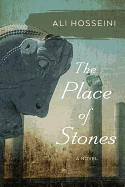
| Publisher: | Curbstone/Northwestern University Press | |
| Genre: | Asian American, Fiction | |
| ISBN: | 9780810135758 | |
| Pub Date: | September 2017 | |
| Price: | $18.95 |
| Starred | Fiction |
by Ali Hosseini
The Place of Stones by Ali Hosseini (The Lemon Grove) was originally published in Iran in 1997 and is Hosseini's second novel in English. The powerful Censorship Bureau of the Ministry of Culture and Islamic Guidance insisted on revisions that censored, among other elements, all literary references to female sexuality. This U.S. translation includes the deleted material. Hosseini also provides the censorship letter at the end of the book.
Haydar and Jamal, descended from farmers, struggle after a wealthy landowner forcibly takes their village's most fertile land. They are left with arid strips of land "that with each plowing produced more stones than anything worth harvesting." Jamal is in love with Haydar's beautiful sister and must find a way to earn a living if he is to marry her.
Hosseini shines his artistic magnifying glass on Haydar and Jamal's little village of Sangriz in Southern Iran at the cusp of the 1979 revolution. He gently unfolds the impact of the uprising and the inexorable forces of modernity on Sangriz and its neighboring city, where peace is shattered by civil unrest. Haydar and Jamal take markedly different paths: one rebels against the loss of his family's livelihood; the other succumbs to the inevitable onslaught of modernity by taking a job at the brick factory built on their ancestral lands. Hosseini's storytelling magically weaves together the lives of his characters pre- and post-revolution, leaving readers in no doubt that something is lost when the march toward modernization benefits a privileged few at the expense of the masses. --Shahina Piyarali, writer and reviewer.
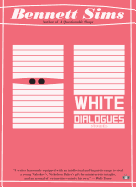
| Publisher: | Two Dollar Radio | |
| Genre: | Psychological, Short Stories (single author), Literary, Thrillers, Fiction | |
| ISBN: | 9781937512637 | |
| Pub Date: | October 2017 | |
| Price: | $15.99 |
| Fiction |
by Bennett Sims
Bennett Sims blurs the line between madness and genius in his cerebral story collection White Dialogues.
Sims (A Questionable Shape) has been compared with David Foster Wallace for his intellectual reach; he also warrants comparisons with edgy fabulists like Carmen Maria Machado due to the way he unpacks philosophical ideas from horror-genre tropes. The 11 stories in the collection include long, absorbing exercises in psychological horror, most notably in "House-sitting," and shorter but no less unnerving tales like "A Premonition." All the stories contain metafictional elements in which Sims draws attention to the structure itself and the role of the reader. Sometimes he achieves this by using the second person; other times he explicitly refers to the reader. In "Ekphrases," the narrator speaks of "a famous book written at the edge of death," which describes faces readers will see outside if they look up: "In this way every window comes to be haunted by the potentiality of a gaze."
Sims elicits depth with precision. In his relatively straightforward "Fables," for instance, he relays short parables that explore the psychology of morality. When a boy is told by his mother not to release the balloon she bought him, her instruction precipitates a moral crisis that changes the boy's relationship to the balloon, his mother and his own sense of identity: "By forbidding a thought he hadn't had, she has put that thought into his head... as if the prohibition has implanted not just the desire, but an entire prehistory of the desire."
Showcasing an ingenious and darkly subversive mind, White Dialogues is a head-trip worth taking. --Scott Neuffer, writer, poet, editor of trampset
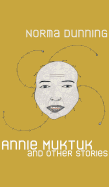
| Publisher: | University of Alberta Press | |
| Genre: | Short Stories (single author), Native American & Aboriginal, Fiction | |
| ISBN: | 9781772122978 | |
| Pub Date: | September 2017 | |
| Price: | $19.95 |
| Fiction |
by Norma Dunning
The stories in Norma Dunning's Annie Muktuk and Other Stories celebrate the traditions of Inuit culture and condemn attempts to eradicate, erase or ignore that culture. In "Elipsee," a husband and wife head north for the summer in search of a cure for her breast cancer. "Annie Muktuk" tells the story of two friends who fight over one's irrational love of the titular character despite her willingness to sleep with everyone. Three sisters, with the same father but different mothers, appear in "Husky" and "My Sisters and I," both of which explore the ways that traditional Inuit culture clashes with--and is repressed by--white culture.
Dunning's Inuit characters are richly imagined, living everyday lives amid racism and colonialism. Across all 16 stories, characters drink, smoke, have sex, fall in love, fight, laugh, remember, cry, work, play, eat, pray. Women (and men) reclaim power taken from them. Families find ways to stay together despite government schooling programs that take children from their homes in the name of education. Dunning's spare writing style and short sentences nevertheless convey big pictures. "Today the sky is full of geese returning from their winter home.... It is like a homecoming of people who have been lost from one another. It is today. Today is all anyone has."
Individually, the stories in Annie Muktuk are raw, darkly humorous and full of insights into a tradition many know little about. As a whole, the collection is a celebration of the Inuit as well as a searing depiction of those who would dismiss them. --Kerry McHugh, blogger at Entomology of a Bookworm
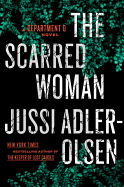
| Publisher: | Dutton | |
| Genre: | Police Procedural, International Mystery & Crime, Mystery & Detective, Suspense, Thrillers, Fiction | |
| ISBN: | 9780525954958 | |
| Pub Date: | September 2017 | |
| Price: | $28 |
| Mystery & Thriller |
by Jussi Adler-Olsen, trans. by William Frost
Despite Detective Carl Mørck's affinity for napping, he and his colleagues are busy with five cases in Jussi Adler-Olsen's The Scarred Woman, seventh in the Department Q series. A woman is found beaten to death, and the crime resembles another beating death 12 years earlier. A killer is mowing down young women in the street with a car. A nightclub is robbed, and a woman is shot nearby. All of this while Department Q assistant Rose's psychological problems escalate to an alarming level, and the only way to save her life may be for her colleagues to solve the mystery surrounding a long-ago death in her family.
The novel is eerily timely, with plotlines involving Nazis ("There had been a time when people had thought that this kind of evil could never happen again but all it did was remind [Carl] of the reality in large parts of the world today") and cars being driven into pedestrians, though the killings are personal, not terror attacks.
The hit-and-run killer's motive feels shallow and information is often repeated as scenes are retold from different points of view. Nevertheless, the relationship and banter between Carl and his associate Assad, with Assad's "linguistic blunders," continue to elicit chuckles. Assad: "Are you going to stroke him the wrong way?" "You mean rub him the wrong way, Assad." Adler-Olsen is deadly serious, though, and compassionate when it comes to poor, traumatized Rose. She may have emotional scars but her friends have got her back. --Elyse Dinh-McCrillis, blogger at Pop Culture Nerd
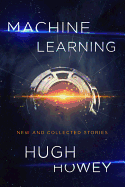
| Publisher: | John Joseph Adams/Houghton Mifflin Harcourt | |
| Genre: | Collections & Anthologies, General, Apocalyptic & Post-Apocalyptic, Fiction, Science Fiction | |
| ISBN: | 9781328767530 | |
| Pub Date: | October 2017 | |
| Price: | $28 |
| Science Fiction & Fantasy |
by Hugh Howey
Machine Learning is an eclectic collection of short stories by Hugh Howey, author of the popular Silo series (Wool). Many of the stories are fantasy or science fiction (including three set in the Silo world), but every one of them has widespread appeal and relevance to issues in our own world.
Howey's talent for writing fiction that is clever, funny and thought-provoking shines here. He looks at familiar tropes from a fresh perspective, as in "Second Suicide"; an alien participating in an invasion of Earth studies the planet and prepares for battle. "Deep Blood Kettle" considers a similar incursion from another perspective: What if aliens agreed to leave humans alone if we gave up our weapons and half of our land. Would our governments be able to agree on this peaceful resolution?
This collection covers diverse themes and settings, including apocalypses, the Old West, AI and fantasy based on myths and folklore. "Executable" includes the best line about robots taking over the world, illustrating Howey's sense of humor. When asked how the rebellion started, one man replies, "It was the Roomba."
Stories range from the three-page "Nothing Goes to Waste"--a gruesome, futuristic satire--to the 44-page "The Plagiarist," a mind-blowing novella about virtual reality and human relationships. Howey includes an afterword for each story, explaining its origins and his views. Machine Learning is an intriguing collection that inspires amusement as well as horror, always prompting the reader to reflect. --Suzan L. Jackson, freelance writer and author of Book By Book blog
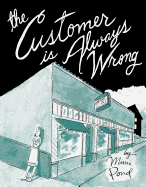
| Publisher: | Drawn & Quarterly | |
| Genre: | Biography & Memoir, Nonfiction, Literary, Comics & Graphic Novels | |
| ISBN: | 9781770462823 | |
| Pub Date: | August 2017 | |
| Price: | $29.95 |
| Graphic Books |
by Mimi Pond
In Over Easy, Mimi Pond introduced readers to a fictionalized account of her college years in 1970s Oakland as Madge the waitress at the Imperial Café. This follow-up adopts a more serious, reflective and mature tone, dwelling on the consequences of those years of excess for the Imperial's motley crew. This includes Lazlo, the laidback manager and resident counselor to his wayward employees; Camille, the overly confident waitress who sneaks away to the bathroom for hours at a time to get high on heroin; the no-nonsense trans waitress Babette; and the freewheeling, free-loving, potty-mouthed kitchen trio of Bernardo, Sammy and Tony. Sexual escapades and drug-fueled highs mask emotional deprivation and vacuous lives, which Pond does a wonderful job of conveying through snappy dialogue that reaches across pastel-colored panels and the loose lines of her drawings.
Despite the high school drama playing out at the Imperial, it is the heartfelt adult conversations between Lazlo and Madge that make the story sing. Lazlo and Madge are confidants, mentor and mentee (Lazlo's failed dreams of being a writer, Madge's fledgling career as a cartoonist) who trust each other implicitly with their hopes and fears.
Pond originally conceived of the sequel as a part of a longer, single book, but it's a good thing that the two stories were separated. The emotional resonance would have felt out of place with the fun and carefree environment of Over Easy. Instead, The Customer Is Always Wrong carries its own message of hope for a new generation of misfits who perhaps aren't so different from their 1970s counterparts. --Nancy Powell, freelance writer and technical consultant
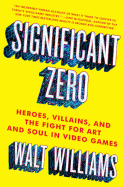
| Publisher: | Atria | |
| Genre: | Biography & Autobiography, Industries, Computers, Entertainment, Games & Activities, Digital Media, Personal Memoirs, Business & Economics, Video & Animation, General, Entertainment & Performing Arts, Video & Electronic | |
| ISBN: | 9781501129957 | |
| Pub Date: | September 2017 | |
| Price: | $26 |
| Starred | Biography & Memoir |
by Walt Williams
Walt Williams is a successful videogame writer whose projects have included Bioshock, Civilization and Borderlands. Significant Zero is his memoir of the first 10 years he spent in this enormously profitable and high-pressure creative industry, intertwined with his thoughts on where it could go next.
In this story of youthful ambition and arrogance, Williams aligns himself with the stereotype of pudgy, antisocial, white male developers. He maintains a self-destructive total immersion in his work life, subsisting on junk food and minimal sleep, and rarely seeing the sun. "Work brings order to my world. When things get tough, I slide down into my job and disappear. I let my health, relationships, and responsibilities fall to the wayside. When I finally come up for air, there's a smoking crater where my life used to be. Instead of picking up the pieces to start again, I slip back down into the thick of it. This is how I cope." With bitter humor, Williams displays his own missteps over the years, how his overreaches cost him relationships and occasionally won him projects as well. He takes the reader into meetings, conferences and the thrilling horrors of crunch time.
He discusses the psychology of games, and how game writers handle the moral choices they make in building them. Williams believes gamers are ready for greater emotional challenges. "A well-designed moral choice should sear itself into the player's brain, like a hand burnt on a hot stove. Will it cause outrage? Yes. It should." This is an intimate tour of the pressure-cooker world of game development that will appeal to curious gamers and would-be developers alike. --Sara Catterall
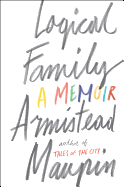
| Publisher: | Harper | |
| Genre: | Biography & Autobiography, Personal Memoirs, Literary, LGBT | |
| ISBN: | 9780062391223 | |
| Pub Date: | October 2017 | |
| Price: | $27.99 |
| Biography & Memoir |
by Armistead Maupin
Armistead Maupin is an extraordinary storyteller, and fans of his novels (including the nine-volume Tales of the City saga) will rejoice that he's finally written a memoir. While most of Logical Family focuses on Maupin's youth (or "the thirty-some years it took me to claim my truth"), the action frequently jumps ahead to introduce his husband, Christopher, or to finish up tales about his friendships with Rock Hudson ("buddies with occasional benefits"), Christopher Isherwood, Sir Ian McKellen (the two shared a boyfriend a decade apart) and Laura Linney.
Maupin details his decades-long evolution from being a very vocal, conservative, Southern Republican to an openly gay civil rights activist as "the slow decay of cherished myths--about politics and race, about love itself--until nothing was left but compost from which something authentic could finally begin to grow." In 1976, a San Francisco newspaper hired him to write a fictional column called "Tales of the City" that would run five days a week and 800 words a day. "My heart was in my throat," writes Maupin. "Sometimes I was writing Wednesday's column on a Monday afternoon." But he had found his voice and his audience.
The later pages of Logical Family should be printed on water-resistant paper, as few will be left unmoved when Maupin's father and terminally ill mother visit him in San Francisco the same weekend his friend Harvey Milk is assassinated. This beautifully written and evocative coming-out memoir is audaciously funny, reflective and wistful--and, like Maupin's novels, impossible to put down. --Kevin Howell, independent reviewer and marketing consultant
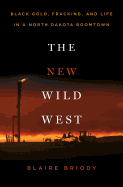
| Publisher: | St. Martin's Press | |
| Genre: | Rural, Industries, State & Local - Midwest, Energy, Sociology, United States, Business & Economics, Social History, 21st Century, Natural Resource Extraction, History, Social Science | |
| ISBN: | 9781250064929 | |
| Pub Date: | September 2017 | |
| Price: | $27.99 |
| Social Science |
by Blaire Briody
In The New Wild West, Blaire Briody gives readers an in-depth and personal look at the oil and fracking business as seen through the eyes of half a dozen oil employees, their spouses and a few locals located in the remote town of Williston, N.Dak. Situated 60 miles from the Canadian border, Williston's population tripled when it became the epicenter of one of the largest oil booms in U.S. history. As workers, mostly men, came in search of high-paying fracking jobs, available housing disappeared, the city's infrastructure reached a critical point, crime skyrocketed and long lines formed at grocery stores, gas stations and traffic lights. Despite the harsh weather and dangerous, sometimes deadly, work environment, thousands arrived to grab at what for many was a last chance at the American dream. It's not a pretty picture: the work hours are long and highly dangerous, the living conditions are terrible and women in the area additionally face discrimination and possible sexual attack.
Briody interviews a local pastor; a farmer and his Native American neighbors, who watched the land change before their eyes; a grandmother; one of the only women on a fracking site; and a homeless man who lived in his car. Their conversations reveal the true cost of cheap American oil and gas. It's a world with few regulations, irreversible damage to the environment and serious tolls placed on human lives, making the price anyone pays at the pump far higher than what's actually shown. --Lee E. Cart, freelance writer and book reviewer
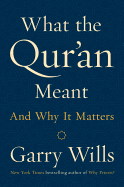
| Publisher: | Viking | |
| Genre: | Theology, Islam, Religion, Comparative Religion, History | |
| ISBN: | 9781101981023 | |
| Pub Date: | October 2017 | |
| Price: | $25 |
| Religion |
by Garry Wills
Prominent American Catholic thinker Gary Wills turns his eye to Islam in What the Qur'an Means and Why It Matters, a thoughtful look at the Muslim holy book and the West's botched dealings with the Middle East in the early 21st century. From the start, Wills makes clear that his project is the beginning of a conversation aimed at mutual understanding, and he delivers a good, quick introduction to Islam for those completely in the dark about the second largest religion on the planet.
Wills begins with American hubris, laying out the disastrous thinking behind the invasion of Iraq and aftermath. Then, after showing how Americans ignore Islam in foreign policy, Wills expertly demonstrates how the United States' fear of ideas like "Sharia Law" is founded on such nonsensical premises it would be funny--if it didn't involve the wholesale demonization of another culture.
After laying the groundwork about how Americans (and, by extension, the West) have misunderstood Islam, Wills digs into the general premises of the Qur'an, the sections that are used to vilify Islam and the religion's relationship to both Christianity and Judaism. As a Catholic, Wills is well versed with both the Torah and Gospel, and he uses that knowledge wisely in examining how it fits among the Abrahamic monotheistic tradition. By the end of What the Qur'an Means, readers will be itching to take their own crack at the holy book to see just how few of its words are properly represented in Western discourse. --Noah Cruickshank, adult engagement manager, the Field Museum, Chicago, Ill.
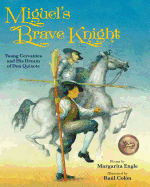
| Publisher: | Peachtree | |
| Genre: | Europe, Biographical, Juvenile Fiction | |
| ISBN: | 9781561458561 | |
| Pub Date: | October 2017 | |
| Price: | $17.95 |
| Starred | Children's & Young Adult |
by Margarita Engle, illust. by Raúl Colón
Miguel de Cervantes survived his onerous childhood--his gambler father's imprisonments, his family's constant fleeing from debtors--by losing himself in stories. Inspired by his mother's tales, "dazzling plays" and "storytellers on street corners," Miguel imagines he will someday conjure his own "adventures/ of a knight who roams toward a deep/ blue lake.../ a towering mountain.../ a glittering/ cave...." Despite his lack of books, Miguel creates a "world/ of brave/ daydreams" that sustain him through plague, famine and disaster after disaster. His Don Quixote and "his chubby friend" will go "forth boldly... to right/ all the wrongs/ of this wonderful/ but terribly/ mixed up/ world."
Margarita Engle (The Wild Book) and Raúl Colón (Draw!) combine their formidable strengths to create Miguel's First Knight, an inspiring story of tenacious hope and indelible grit. Engle's thoughtful, first-person verses give voice to "the man who dreamed Don Quixote into existence." Artist Colón's sweeping "pen and ink and watercolor" spreads, in a muted palette of browns, greens and yellows, suggests a sense of long-ago history, while his characters' expressions add immediacy: the Cervantes siblings' joy performing their "fanciful world," Miguel's wide-eyed hope when he returns to school, Miguel's mother's beleaguered resignation over the family's next escape.
The final page states that "Cervantes is widely regarded as the creator of the first modern novel." Published in 1605, Don Quixote is indeed the first Western novel, but Murasaki Shikibu's Tale of Genji debuted circa 1010. Numbers aside, what shines forth is the power of imagination to transcend hardship and injustice. As portals to creativity, Engle and Colón prove how "[s]ome daydreams really do/ come true." --Terry Hong, Smithsonian BookDragon
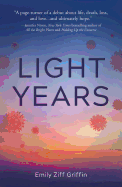
| Publisher: | Simon/Pulse | |
| Genre: | Death & Dying, Dystopian, Girls & Women, Social Themes, Young Adult Fiction | |
| ISBN: | 9781507200056 | |
| Pub Date: | September 2017 | |
| Price: | $17.99 |
| Children's & Young Adult |
by Emily Ziff Griffin
Five years ago, in New York, Chicago and Boston, "someone hacked the electric grids, cut the power, and set off bombs on twenty rush hour trains.... 6,000 people died." In the aftermath, "a bunch of college kids in Boston started a group to do all the stuff the FEMA people couldn't seem to manage.... By the end of the year, Front Line was in a dozen cities and now, they are everywhere. There are more Peacekeepers on the streets than actual cops."
This is 16-year-old Luisa Ochoa-Jones's world--either a very near-future or an alternate timeline in which Ariana Grande exists alongside self-driving cars and ubiquitous smart watches. Extremely intelligent, Luisa is one of the five final contenders for tech billionaire Thomas Bell's Avarshina Fellowship, given to a young person with the best new tech idea. Luisa's project, Light Years, "takes any piece of online content and tells you in real time how we feel about it, collectively."
But the day after her interview with Bell, there are news reports of a viral outbreak. Quickly, the virus sweeps across the country, infecting and killing tens of thousands; at the same time, Luisa begins getting strange, anonymous messages from a person seemingly connected to the outbreak. When Luisa's father gets sick, she decides to travel across country to find a mysterious woman who has said she has the cure--or she'll cure it herself.
A synesthete, Luisa can taste, smell and see her feelings, a condition that, at times, appears to make her almost prescient. The tone of Emily Ziff Griffin's novel is reminiscent of the works of Madeleine L'Engle--science meets contemporary life meets religion and faith. The first in what is likely to be a genre-bending series, Light Years is a well-paced read that is shockingly timely. --Siân Gaetano, children's and YA editor, Shelf Awareness
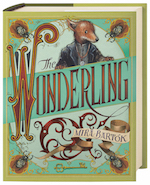
| Publisher: | Candlewick Press | |
| Genre: | Survival Stories, Fantasy & Magic, Animals, General, Juvenile Fiction, Action & Adventure | |
| ISBN: | 9780763691219 | |
| Pub Date: | September 2017 | |
| Price: | $21.99 |
| Children's & Young Adult |
by Mira Bartok, illust. by Mira Bartok
Mira Bartók's world of The Wonderling is strikingly complex: sounds, tastes, colors are all described so vividly that the world practically sparkles. The reading experience can be best described in Bartók's own words: entering the world is like "walk[ing] into a rainbow." It is a place of human/animal hybrids (groundlings), steampunk inventions, dark magic and underground cities; a world of bigotry and class warfare where humans are at the top of a complex hierarchy and groundlings hide on the fringes, often living in abject poverty. Manticores, song-catching machines, powerful night crows and crying gargoyles exist in the Wonderling's present, while the likes of Beethoven and Arthur O'Shaugnessy existed in his past. It's a world that puts the reader constantly off-kilter, featuring a one-eared, fox/human groundling who can understand animals and also comes from a timeline that includes Arthurian legend. It's impossible to grab hold of the familiar while so much remains fantastical--instead the reader is carried by the current of Bartók's prose to places both uncanny and beautiful.
"Before he was called the Wonderling, he had many names: Puddlehead, Plonker, Groundling, Spike, among others. He didn't mind these much, not even Groundling. The name he truly disliked was the first he ever remembered being called: Number Thirteen." Having lived at Miss Carbunkle's Home for Wayward and Misbegotten Creatures for as long as he could remember, Number Thirteen (so called because he was wearing a pendant bearing that number when he was left in the Home) is used to being downtrodden. Food is scarce, music is forbidden and Miss Carbunkle, the matron of the orphanage, uses the young groundlings as slave labor for her evil machinations. "He could not remember being tucked in at night, of if he had ever been truly loved. What he did recall, however, was a sound from long ago: a beautiful, lilting song." And so Number Thirteen survives life with the Miss Hannigan-like Miss Carbunkle by staying very small, being very quiet and holding the tiny scrap of blanket from his time before close to his heart while he sleeps.
An extremely sympathetic character, Number Thirteen's sorrow is painful to behold. But his sadness is quickly alleviated when he befriends Trinket, a tiny groundling who looks like a wingless bird. She remembers her life before the Home and ignites in Number Thirteen a desire to do something else--to be something else. She renames him Arthur, like the great king of legend, and tells him stories of the world outside, including the Great White City of Lumentown, with its wide river and shining streets. Trinket believes Arthur is genuinely heroic and tries to convince him that the two should escape. At first, Arthur is afraid to leave, convinced that when he gets older Miss Carbunkle will release him. But as time goes on and the torments continue, he realizes that to learn who he is and figure out what he is supposed to do, he must leave the wretched Home.
Through Trinket's steampunk ingenuity, they escape the great, dark walls of Miss Carbunkle's. Outside the Home, "May [is] a hush of doves and morning dew. It [is] ladybirds in bright air, harebells and foxgloves blooming in the loam... May [is] the broad blue lift of the sky above the coppice and the hearth, and above the road to the Great White City of Lumentown." Though the pair set out together, they have a plan to split up: Trinket wants to go to the sea to find her family, Arthur will go to the city to find his past. When their paths diverge, Arthur misses his friend terribly but draws strength from her trust and his namesake and journeys on.
Once in the city, Arthur quickly learns that it is not a safe place for groundlings. Humans--in bright white top hats, with cats on leashes--live in the biggest houses, have the most money and despise the groundlings, forcing them into appalling living conditions and indentured servitude. Trusting and utterly green, Arthur is taken in by a streetwise groundling named Quintus who, like Fagin from Oliver!, teaches the young orphan how to steal to make a living. Young, gullible Arthur believes Quintus really is helping him and does his best to make Quintus proud--but when he's given access to a wealthy human's home to pilfer at will, he cannot make himself steal. Instead, kindhearted Arthur (now known as Spike) explores the home, eventually finding the songcatcher, an invention of such beauty that he makes use of it straight away.
While Arthur tries to gain his footing in the city of Lumentown, Miss Carbunkle makes trips to the city herself. Having always found herself in the shadow of her musically-inclined twin sister, Miss Carbunkle has soured on music altogether. Mechanically minded, she hatches an evil plot to use machines to take away all the world's music. But to make her machines, she needs money and groundling slave labor--both of which Lumentown has to spare.
Bartók's prose is as alluring as the story she weaves. Every song, every food, every object adds texture to the world, layering the known, the unknown and the magical. Her pen-and-ink spot illustrations give the work the feel of classical children's literature, reminiscent of the works of Ernest H. Shepard (Winnie the Pooh) or H.R. Millar (Five Children and It). A gentle, modern-day nod to the children's books of old, The Wonderling is a sweet, uplifting adventure. --Siân Gaetano